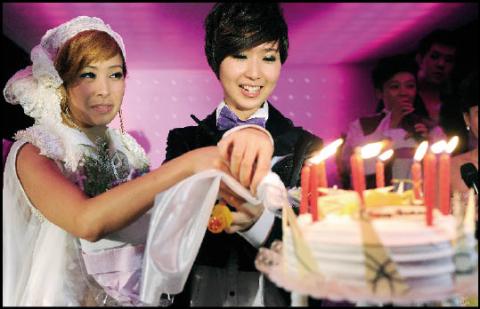About 80 lesbian couples tied the knot in Taiwan’s biggest same-sex “wedding party,” with organizers saying yesterday they hoped Taiwan would become the first place in Asia to legalize gay marriage.
Many of the couples donned white dresses and veils for the “Barbie and Barbie’s wedding,” which was held overnight in downtown Taipei, attracting about 1,000 visitors, including friends, relatives and curious onlookers.
“I feel very hopeful that Taiwan will legalize same-sex marriage soon,” said one of the brides, 32-year-old stylist Celine Chen, who plans a honeymoon in New York, which in June became the sixth US state to legalize gay marriage.

Photo: Sam Yeh, AFP
Even though same-sex unions are not allowed in Taiwan, the ceremonies — which had no legal force — went on smoothly without police interference or protests.
Many of the couples kissed, hugged and posed for photographs while receiving an unofficial certificate from the organizers that stated they were now “united in holy matrimony.”
The event climaxed with a couple exchanging rings and saying “I do” amid roaring cheers from the crowd. However, in a brief moment of sadness, some of the participants acknowledged that the marriages were not bona fide.
“The wedding party is fun, but it’s not real,” said Coral Huang, who has been with her partner for eight years and intends to go to Europe to wed legally. “Getting a genuine marriage certificate is very meaningful as it shows that we are being recognized and accepted.”
Gay marriage is not legal anywhere in Asia and although Nepal’s Supreme Court has approved it, no legislation has been passed in Kathmandu to put the ruling into effect.
Taiwan is becoming more open-minded toward its homosexual population and the country’s gay rights groups last year said they had hosted Asia’s biggest gay pride parade, with a turnout of 30,000 from at home and abroad.
In a 2008 opinion poll by the International Social Survey Programme, a global network dedicated to social science research, 17.5 percent of Taiwanese participants said that homosexual behavior was “not wrong at all.”
While significantly lower than the US, where 32.3 percent held that view, it was much higher than the 5.5 percent in Japan and 4.4 percent in the Philippines.
The Cabinet in 2003 drafted a controversial bill to legalize same-sex marriages and allow homosexual couples to adopt children, but President Ma Ying-jeou (馬英九) has said public consensus was needed before the government can move ahead with the law.
Some couples remained pessimistic the government would go through with the legislation.
“It is too difficult now as the Taiwanese culture and customs are still more conservative,” said Jessica, a kindergarten teacher who declined to give her last name and who keeps her sexual orientation from her colleagues.
Activists also noted that legalizing gay marriage is unlikely to figure on Taiwan’s political agenda in the near future.
“Politicians say they respect same-sex unions and take it seriously as a human rights issue, but we don’t see them take any actions,” said Chen Pin-ying (陳品穎), executive chief editor of Lez’s Meeting Magazine, which hosted the party.
“This is the political reality as gays are a minority group,” Chen said.

Chinese Nationalist Party (KMT) Chairman Eric Chu (朱立倫), spokeswoman Yang Chih-yu (楊智伃) and Legislator Hsieh Lung-chieh (謝龍介) would be summoned by police for questioning for leading an illegal assembly on Thursday evening last week, Minister of the Interior Liu Shyh-fang (劉世芳) said today. The three KMT officials led an assembly outside the Taipei City Prosecutors’ Office, a restricted area where public assembly is not allowed, protesting the questioning of several KMT staff and searches of KMT headquarters and offices in a recall petition forgery case. Chu, Yang and Hsieh are all suspected of contravening the Assembly and Parade Act (集會遊行法) by holding

PRAISE: Japanese visitor Takashi Kubota said the Taiwanese temple architecture images showcased in the AI Art Gallery were the most impressive displays he saw Taiwan does not have an official pavilion at the World Expo in Osaka, Japan, because of its diplomatic predicament, but the government-backed Tech World pavilion is drawing interest with its unique recreations of works by Taiwanese artists. The pavilion features an artificial intelligence (AI)-based art gallery showcasing works of famous Taiwanese artists from the Japanese colonial period using innovative technologies. Among its main simulated displays are Eastern gouache paintings by Chen Chin (陳進), Lin Yu-shan (林玉山) and Kuo Hsueh-hu (郭雪湖), who were the three young Taiwanese painters selected for the East Asian Painting exhibition in 1927. Gouache is a water-based

Taiwan would welcome the return of Honduras as a diplomatic ally if its next president decides to make such a move, Minister of Foreign Affairs Lin Chia-lung (林佳龍) said yesterday. “Of course, we would welcome Honduras if they want to restore diplomatic ties with Taiwan after their elections,” Lin said at a meeting of the legislature’s Foreign Affairs and National Defense Committee, when asked to comment on statements made by two of the three Honduran presidential candidates during the presidential campaign in the Central American country. Taiwan is paying close attention to the region as a whole in the wake of a

OFF-TARGET: More than 30,000 participants were expected to take part in the Games next month, but only 6,550 foreign and 19,400 Taiwanese athletes have registered Taipei city councilors yesterday blasted the organizers of next month’s World Masters Games over sudden timetable and venue changes, which they said have caused thousands of participants to back out of the international sporting event, among other organizational issues. They also cited visa delays and political interference by China as reasons many foreign athletes are requesting refunds for the event, to be held from May 17 to 30. Jointly organized by the Taipei and New Taipei City governments, the games have been rocked by numerous controversies since preparations began in 2020. Taipei City Councilor Lin Yen-feng (林延鳳) said yesterday that new measures by